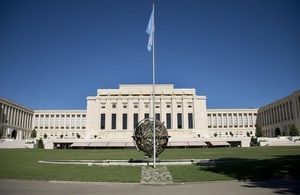Interactive dialogue with the United Nations Special Rapporteur on Violence Against Women
During the 29th Session of the Human Rights Council, the UK delivered a statement in response to the United Nations Special Rapporteur on Violence Against Women.

Read 'UK Statement in response to the United Nations Special Rapporteur on the Violence Against Women'' article
Thank you Mr President.
The United Kingdom would like to thank the Special Rapporteur for her visit to the UK, where she was able to visit all the facilities she requested in advance of her trip.
As the Special Rapporteur notes, the UK Government has made protecting women and girls a key priority and we are proud of the measures we have taken to end violence and protect their human rights at home and abroad.
I would like to draw attention to a few of our key achievements which have made a practical difference to the lives of women and girls. We have introduced a Domestic Violence Disclosure Scheme. This allows women to check their partner’s criminal history and Domestic Violence Protection Orders which can bar a perpetrator from a victims home for up to 28 days. We have criminalised forced marriage and introduced a new offence of coercive and controlling behaviour in relation to domestic abuse. We are introducing mandatory reporting of FGM to the police. We have created two new stalking laws and commissioned training to improve the understanding of stalking amongst those who come into contact with victims.
Aside from legislative reform, we are also committed to ensuring necessary resource is in place to realise our ambitious agenda. By way of example, the UK has committed more than £45m since 2010 for violence against women and girls services, plus an additional £10m for domestic violence refuges and an uplift of £7m for services to support victims of sexual violence and child sexual abuse up until 2016.
And we recognise the need to further promote gender equality in order to tackle the root causes of violence against women and girls. Under this Government there are more women in employment, more women on company boards and more women running their own business than ever before. The gender pay gap is currently at its lowest point on record, and for women under 40 working full time, it has been virtually eliminated. The Government remains determined to eliminate the gender pay gap for all.
We believe that it is right to support local areas to get right their responses on the ground to violence and abuse, and their provision of services to victims. We have devolved power, resources and accountability to local areas who are best placed to make decisions about local need. By way of example, we will work with local authorities, the National Health Service and Police and Crime Commissioners to establish a secure future for Female Genital Mutilation and forced marriage units, refuges and rape support centres.
All around the UK we are making a real difference to the lives of women and girls. As the Special Rapporteur notes, In Wales for example, the Violence against Women, Domestic Abuse and Sexual Violence (Wales) Act 2015 has been introduced. Its overarching purpose is to improve the public sector response in Wales to gender-based violence, domestic abuse and sexual violence. The Act is supported by an ambitious and comprehensive programme of work, including implementing a National Training Framework and delivering a Whole School Approach to Healthy Relationships.
I would also like to briefly mention how we are improving the experience of victims and witnesses in trials of sexual offences by making sure all publicly-funded advocates in cases involving serious sexual offences are specially trained and giving vulnerable witnesses greater opportunity to give evidence away from the courtroom. We will strengthen victims’ rights further with a new Victims’ Law that will enshrine key rights for victims.
Mr President
At home and overseas, the UK Government is committed to bringing often hidden, sensitive and neglected issues into the spotlight no matter where they happen. In the last two years we hosted three major international summits - the Call to Action on Protecting Women and Girls in Emergencies; the Global Summit to End Sexual Violence in Conflict; and the Girl Summit on eliminating female genital mutilation and child, early and forced marriage in a generation.
Internationally, the UK is investing £25m over five years (2013-2018) in a pioneering violence against women and girls research and innovation fund: ‘What Works to Prevent Violence’. The UK is also making the largest single donor commitment ever to end FGM- £35 million- worldwide as part of our vision to see an end to the practice in one generation. And, following the Girl Summit, the Department for International Development approved a further programme of up to £36 million to accelerate action to end child marriage in 12 priority countries where there is a high prevalence.
Mr President
The UK Government is therefore clear that violence against women and girls is unacceptable at home and overseas. We want to see a world in which women and girls in every country are able to live their lives free from violence and we are working to achieve this.
Thank you, Mr President.